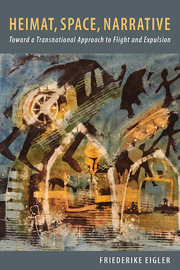Book contents
- Frontmatter
- Dedication
- Contents
- Acknowledgments
- Introduction: Geocritical Approaches to Place-Bound Belonging
- Part I Reassessing the Study of Heimat, Space, and Postwar Expulsion
- Part II Horst Bienek's Novels on Upper Silesia (1975–82)
- Part III Contemporary Novels
- Conclusion: “Lived Spaces” in Literary Narratives
- Filmography
- Works Cited
- Index
Part III - Contemporary Novels
Published online by Cambridge University Press: 05 August 2014
- Frontmatter
- Dedication
- Contents
- Acknowledgments
- Introduction: Geocritical Approaches to Place-Bound Belonging
- Part I Reassessing the Study of Heimat, Space, and Postwar Expulsion
- Part II Horst Bienek's Novels on Upper Silesia (1975–82)
- Part III Contemporary Novels
- Conclusion: “Lived Spaces” in Literary Narratives
- Filmography
- Works Cited
- Index
Summary
Introduction: Remembering Lost Places of Belonging, Imagining New Ones
Discourses on the contested issues of German wartime suffering in general and on flight and expulsion in particular have undergone major changes over the past two decades. As discussed in chapter 3, a new generation of scholars has critically engaged with representations of German victims of the Second World War, an engagement that has been largely absent from pre-1990 scholarship. While my in-depth analysis of Bienek's tetralogy in part II has benefited from this recent scholarship, it has also illustrated the extent to which this comprehensive literary account of Upper Silesia predates nuanced scholarly approaches to flight and expulsion and to the “lost Heimat in the East.” Arguably, throughout the 1970s and early 1980s literary accounts of these historically fraught issues were ahead of scholarship. This situation has changed over the past two decades. Today, scholarly and literary discourses often interact in a mutually beneficial manner.
In chapters 6 and 7, I focus on contemporary novels, published in the last fifteen years, that revisit historical issues of flight, expulsion, and forced relocation within contemporary German and Polish contexts. Unlike Horst Bienek, who experienced the war and the flight from Eastern territories firsthand and whose autobiographical perspective shapes his literary account of Upper Silesia, the authors of these more recent novels are part of the second and third postwar generations: they are the children and grandchildren of the war generation. As others have convincingly argued, generational cohorts and generational ties are significant when looking at issues of trauma, guilt, and repression in the context of the Second World War and its aftermath.
- Type
- Chapter
- Information
- Heimat, Space, NarrativeToward a Transnational Approach to Flight and Expulsion, pp. 125 - 128Publisher: Boydell & BrewerPrint publication year: 2014

